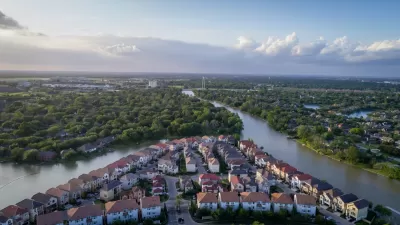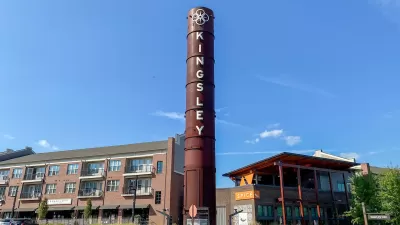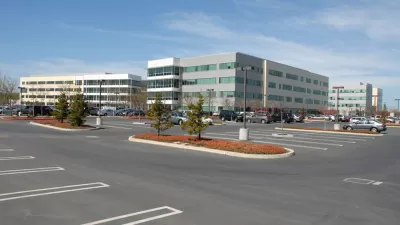Developers in Fort Bend County are drawing inspiration from ‘agrihoods’ to build car-light communities in one of the nation’s fastest-growing areas.

Fort Bend County, a rapidly growing county adjacent to Houston, Texas, more than doubled its population in the last two decades, writes John Brannen in the Kinder Institute for Urban Research’s Urban Edge blog. Now, developers building in the largely suburban and rural area are taking cues from cities to create communities with urban-style amenities that retain a connection to their rural, agricultural roots.
One development, Indigo, aims to be “an ecosystem” that connects housing, agriculture, and other uses in a compact area. “What we’re trying to accomplish is human-oriented development. When you start thinking through a humanistic lens, you start to uncover some challenges, some opportunities and some solutions,” says Indigo developer Clayton Garrett.
According to Brannen, “Indigo will feature eight housing types, with 650 units for purchase and 100 rental properties. They include cottages, three-story townhomes, duplex-style housing called “duets,” 35-foot and 45-foot alley-loaded homes with rear-facing garages and a small number of traditional 50-foot frontloaded homes — the only homes that will have driveways on the street.” Every other street in the development will be a linear park.
Indigo co-developer Snodgrass says “All of the residents’ local travel for immediate daily needs, exercise, and leisure can be handled by walking. Eighty-five percent of our homes are within a quarter mile of our town center area.” However, Snodgrass acknowledges the limitations of building a new community in an area lacking a local bus system, where residents will still need to rely on personal vehicles for longer trips.
FULL STORY: As Fort Bend becomes increasingly urban, developers see opportunity to rethink neighborhood design

Planetizen Federal Action Tracker
A weekly monitor of how Trump’s orders and actions are impacting planners and planning in America.

Congressman Proposes Bill to Rename DC Metro “Trump Train”
The Make Autorail Great Again Act would withhold federal funding to the system until the Washington Metropolitan Area Transit Authority (WMATA), rebrands as the Washington Metropolitan Authority for Greater Access (WMAGA).

The Simple Legislative Tool Transforming Vacant Downtowns
In California, Michigan and Georgia, an easy win is bringing dollars — and delight — back to city centers.

The Small South Asian Republic Going all in on EVs
Thanks to one simple policy change less than five years ago, 65% of new cars in this Himalayan country are now electric.

DC Backpedals on Bike Lane Protection, Swaps Barriers for Paint
Citing aesthetic concerns, the city is removing the concrete barriers and flexposts that once separated Arizona Avenue cyclists from motor vehicles.

In These Cities, Most New Housing is Under 441 Square Feet
With loosened restrictions on “micro-housing,” tiny units now make up as much as 66% of newly constructed housing.
Urban Design for Planners 1: Software Tools
This six-course series explores essential urban design concepts using open source software and equips planners with the tools they need to participate fully in the urban design process.
Planning for Universal Design
Learn the tools for implementing Universal Design in planning regulations.
Smith Gee Studio
City of Charlotte
City of Camden Redevelopment Agency
City of Astoria
Transportation Research & Education Center (TREC) at Portland State University
US High Speed Rail Association
City of Camden Redevelopment Agency
Municipality of Princeton (NJ)





























